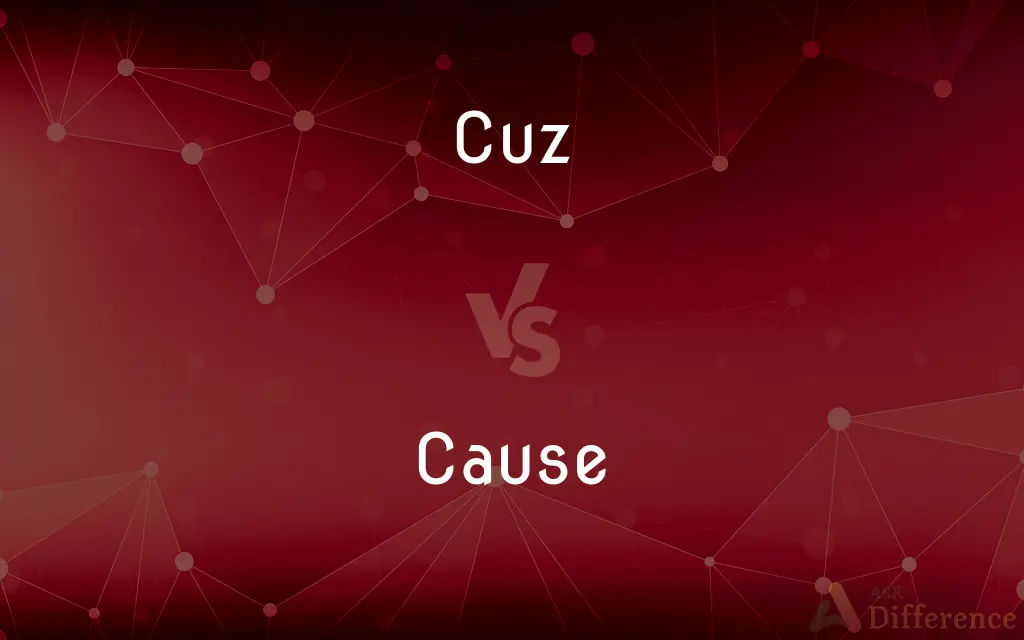Cuz vs. Cause — What's the Difference?
By Maham Liaqat & Fiza Rafique — Updated on April 8, 2024
"Cuz" is a colloquial abbreviation for "because," used informally in speech and text, while "cause" can mean a reason for an action or a principle for which one stands, and is also a shortened form of "because" in informal contexts.

Difference Between Cuz and Cause
Table of Contents
ADVERTISEMENT
Key Differences
"Cuz" primarily serves as a slang or informal shorthand for "because," reflecting a casual tone often found in text messages or casual conversation. It's a phonetic abbreviation that captures the spoken form of "because," making it popular in informal digital communications. On the other hand, "cause" is a versatile term with multiple meanings: it can denote the reason behind an event, represent a principle or aim one supports (as in "a cause"), and informally, it can also serve as a contraction for "because." The use of "cause" in place of "because" mirrors the informal usage of "cuz," but "cause" maintains its formal meanings in different contexts, adding layers to its utility and understanding.
In written English, "cuz" is almost exclusively informal and might be considered inappropriate in formal or academic settings, where "because" is preferred. "Cause," when used to mean "because," shares this informal nature; however, its other meanings related to reasons or principles are perfectly acceptable in formal writing. This duality showcases the flexibility of "cause" across various contexts, unlike "cuz," which is limited to informal exchanges.
The popularity of "cuz" in informal digital communication reflects broader trends towards efficiency and brevity in text-based conversations, where shortcuts and abbreviations are common. "Cause," when used in the sense of "because," participates in this trend, though it can also appear in more thoughtful or argumentative discourse, especially when discussing reasons or motivations.
Cultural references and linguistic evolution continue to influence the usage of both terms. "Cuz" is emblematic of a more relaxed, conversational style that resonates with younger generations and informal settings. Meanwhile, "cause" carries the weight of formal discourse when used in its primary sense, but adapts to informal contexts when used as a substitute for "because," demonstrating the fluidity of language in adapting to communicative needs.
Comparison Chart
Definition
Informal abbreviation for "because."
A reason for an action; a principle or aim; informally, a short form of "because."
ADVERTISEMENT
Usage Context
Informal, including text messages and casual speech.
Both formal (when referring to reasons or principles) and informal (as an abbreviation for "because").
Tone
Casual, conversational.
Depends on usage: formal when discussing reasons or principles; informal when used as a contraction.
Appropriateness
Not suitable for formal or academic contexts.
Suitable in formal contexts when discussing reasons or principles; informally acceptable as a contraction for "because."
Popularity
Popular in digital communication for its brevity.
Widely used in both formal and informal contexts, depending on meaning.
Compare with Definitions
Cuz
Reflects a relaxed tone, common in digital communication.
Can't go out tonight cuz I'm grounded.
Cause
Informally, a contraction for "because."
I'm happy cause I passed my exam.
Cuz
Avoided in formal or academic writing.
Please explain, without using cuz, why you chose this answer.
Cause
A reason something happens or is done.
The heavy rain was the cause of the flooding.
Cuz
Informal shorthand for "because," used in casual conversation or text.
I'm late cuz I missed the bus.
Cause
A principle or aim that is supported or promoted.
She volunteers for the cause of animal welfare.
Cuz
A marker of conversational style in text.
Bought it just cuz it was on sale.
Cause
Used in formal and informal contexts, depending on the meaning.
They're protesting for a just cause.
Cuz
Often used among younger generations or in informal settings.
Skipping class cuz it's boring.
Cause
Requires clarity in usage to avoid confusion between its meanings.
The cause he's fighting for is noble.
Cuz
(informal) because
Cause
Because.
Cuz
(informal) because
Cause
The producer of an effect, result, or consequence.
Cuz
(informal) cousin (usually as a term of address, but not necessarily towards one's cousin)
Cause
The one, such as a person, event, or condition, that is responsible for an action or result.
Cause
A basis for an action or response; a reason
The doctor's report gave no cause for alarm.
Cause
A goal or principle served with dedication and zeal
“the cause of freedom versus tyranny” (Hannah Arendt).
Cause
The interests of a person or group engaged in a struggle
“The cause of America is in great measure the cause of all mankind” (Thomas Paine).
Cause
A lawsuit or criminal prosecution.
Cause
The ground or basis for a lawsuit.
Cause
A subject under debate or discussion.
Cause
To be the cause of or reason for; result in.
Cause
To bring about or compel by authority or force
The moderator invoked a rule causing the debate to be ended.
Cause
The source of, or reason for, an event or action; that which produces or effects a result.
They identified a burst pipe as the cause of the flooding.
Cause
Sufficient reason for a state, as of emotion.
There is no cause for alarm.
The end of the war was a cause for celebration.
Cause
(countable) A goal, aim or principle, especially one which transcends purely selfish ends.
Cause
(obsolete) Sake; interest; advantage.
Cause
Any subject of discussion or debate; a matter; an affair.
Cause
A suit or action in court; any legal process by which a party endeavors to obtain his claim, or what he regards as his right; case; ground of action.
Cause
(transitive) To set off an event or action.
The lightning caused thunder.
Cause
(ditransitive) To actively produce as a result, by means of force or authority.
His dogged determination caused the fundraising to be successful.
Cause
(obsolete) To assign or show cause; to give a reason; to make excuse.
Cause
Alternative form of 'cause; because
Cause
That which produces or effects a result; that from which anything proceeds, and without which it would not exist.
Cause is substance exerting its power into act, to make one thing begin to be.
Cause
That which is the occasion of an action or state; ground; reason; motive; as, cause for rejoicing.
Cause
Sake; interest; advantage.
I did it not for his cause.
Cause
A suit or action in court; any legal process by which a party endeavors to obtain his claim, or what he regards as his right; case; ground of action.
Cause
Any subject of discussion or debate; matter; question; affair in general.
What counsel give you in this weighty cause!
Cause
The side of a question, which is espoused, advocated, and upheld by a person or party; a principle which is advocated; that which a person or party seeks to attain.
God befriend us, as our cause is just.
The part they take against me is from zeal to the cause.
Cause
To effect as an agent; to produce; to be the occasion of; to bring about; to bring into existence; to make; - usually followed by an infinitive, sometimes by that with a finite verb.
I will cause it to rain upon the earth forty days.
Cause that it be read also in the church of the Laodiceans.
Cause
To assign or show cause; to give a reason; to make excuse.
Cause
Abbreviation of Because.
Cause
Events that provide the generative force that is the origin of something;
They are trying to determine the cause of the crash
Cause
A justification for something existing or happening;
He had no cause to complain
They had good reason to rejoice
Cause
A series of actions advancing a principle or tending toward a particular end;
He supported populist campaigns
They worked in the cause of world peace
The team was ready for a drive toward the pennant
The movement to end slavery
Contributed to the war effort
Cause
Any entity that causes events to happen
Cause
A comprehensive term for any proceeding in a court of law whereby an individual seeks a legal remedy;
The family brought suit against the landlord
Cause
Give rise to; cause to happen or occur, not always intentionally;
Cause a commotion
Make a stir
Cause an accident
Cause
Cause to do; cause to act in a specified manner;
The ads induced me to buy a VCR
My children finally got me to buy a computer
My wife made me buy a new sofa
Common Curiosities
How can I use "cause" in a sentence to mean something other than "because"?
You can use it to refer to a reason behind an action (e.g., "The storm was the cause of the power outage") or to describe a principle one supports (e.g., "He's passionate about environmental causes").
Can "cause" be used in place of "because" in professional emails?
While it can be used, it's generally better to use "because" in professional communications to maintain formality.
Do "cuz" and "cause" mean the same thing when abbreviated?
Yes, in informal contexts, both can serve as abbreviations for "because," though "cause" has additional meanings.
Is "cuz" acceptable in formal writing?
No, "cuz" is considered too informal for formal writing and should be avoided.
Is it correct to use "cuz" in academic essays?
No, "cuz" is too informal for academic essays, where standard language is required.
Why is "cuz" popular in text messages?
Its popularity stems from its brevity and reflection of conversational speech, making it convenient for quick, informal communication.
What is a common mistake people make when using "cause"?
A common mistake is using "cause" ambiguously, where it's unclear if it means "because" or refers to a reason or principle, leading to confusion.
Can "cause" be used to start a sentence?
Yes, "cause" can start a sentence when used as a contraction for "because" in informal writing or speech, but starting sentences with "Because" (or its informal forms) should be handled with care in formal writing.
How has the usage of "cuz" evolved over time?
Its usage has increased with the rise of digital communication, becoming a staple in informal texts and social media.
What's a tip for remembering when to use "cuz" vs. "cause"?
Use "cuz" for casual, informal text or speech among friends or in non-professional settings, and "cause" when referring to reasons or principles in more formal contexts or as an informal "because."
Share Your Discovery

Previous Comparison
Inter vs. Enter
Next Comparison
Crystal vs. GeodeAuthor Spotlight
Written by
Maham LiaqatCo-written by
Fiza RafiqueFiza Rafique is a skilled content writer at AskDifference.com, where she meticulously refines and enhances written pieces. Drawing from her vast editorial expertise, Fiza ensures clarity, accuracy, and precision in every article. Passionate about language, she continually seeks to elevate the quality of content for readers worldwide.














































